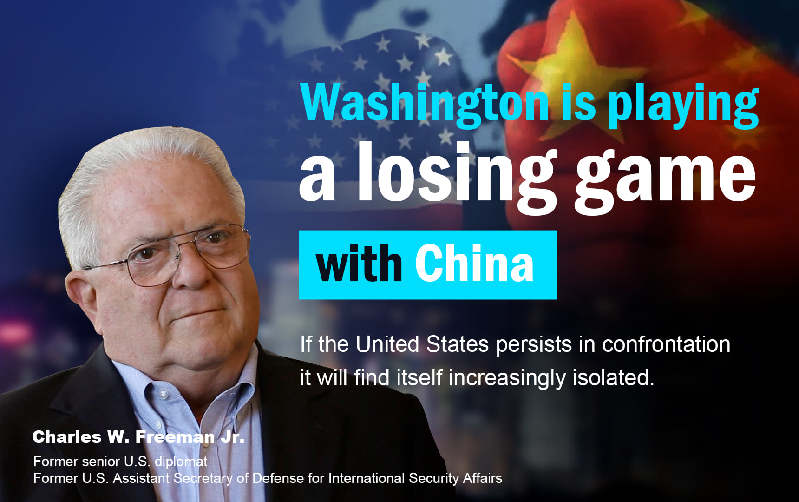


Washington's latest policies to contain China will prove self-defeating, said Chas Freeman in an article published on the East Asia Forum.
PLAYING A LOSING GAME
"Washington would be easy to spot in a game of chess," argued the former US Assistant Secretary of Defense, "It's the player with no plan beyond an aggressive opening."
His article stated that Washington erred in its decision to launch a trade dispute against China.
Not only have the tariffs and sanctions failed to reduce US trade deficits, but they have also harmed American workers and consumers.
"US farmers have lost most of their US$24 billion Chinese market. US companies have had to accept lower profits, cut wages and jobs, defer wage hikes, and raise prices for American consumers," said the article.
According to a study commissioned by the US-China Business Council, the Sino-US trade conflicts have cost an estimated 245, 000 US jobs. The study also warned of an "escalation scenario" where the "decoupling" of the world's two largest economies could shave about $1.6 trillion off US GDP over the next five years.
HAWKING BACK TO THE OLD TONE
Despite the calls for steering US foreign policy back to the pre-Trump channels, President Joe Biden still echoes the tone of his predecessor by depicting Beijing as a threat to global order.
"It has become a cottage industry in Washington these days to highlight all the many ways in which China threatens US, Western, and Asian interests," said an opinion piece published in the Foreign Policy magazine.
Inflammatory adjectives are used when describing Beijing's "expansionist" and "aggressive" military, "implacably hostile" ideology, "predatory" economic and tech policies, and "insidious" overseas influence operations.
Chinese activities, as Biden declared in the US - Japan Joint Leaders' Statement, are "inconsistent with the international rules-based order", and allegedly harm the "peace and prosperity in the Indo-Pacific region and the world".
The same old same old.
Washington needs to respond to a changing China based on facts, not dangerous rhetoric, the article pointed out.
Take a closer look at the concern over China's "aggressive" military. The truth is there are US aircraft and ships aggressively patrolling China's borders, but no Chinese aircraft or ships off America's coast. While the conventional military of China lives on what is equivalent to a fraction of US military budget, China's nuclear capabilities are also far below those of the US'.
It's clear that the actual challenge for the US is not the imagined existential threats posed by China. Instead, it lies in developing a factually based understanding of China's development and the opportunities China offers.
BRINGING CHINA INTO THE FOLD
Decoupling is the wrong way to go. Antagonism, seeking to hamstring one other, is not counterproductive. It entrenches hostility, justifies hatred, injures, and threatens to weaken both sides, said Freeman.
In the context of bilateral cooperation, China's capacity could be understood as leverage instead of threats to serve US interests.
As Freeman wrote in his article, Washington should work with China to ease the inevitable transition from dollar hegemony to a multilateral monetary order in ways that preserve American influence; leverage, not boycott, China's "Belt and Road" Initiative to benefit from its opportunities and connectivities; and expand consular relations, restore exchanges, and promote Chinese studies to enhance understanding of China.
The former US official also stressed the need for a US policy involving the competitive efforts to deal with common overriding threats.
"The United States needs to cooperate with China to reform global governance and address global problems of common concern like the mitigation of environmental degradation, pandemics, nuclear proliferation, global economic and financial instability, global poverty, and set standards for new technologies."
To cope with global challenges, countries, without exception, want multilateral backing rather than unilateral US confrontation. If the US won't give up confrontation with China, it will find itself in isolation.
点击右上角![]() 微信好友
微信好友
 朋友圈
朋友圈

请使用浏览器分享功能进行分享
